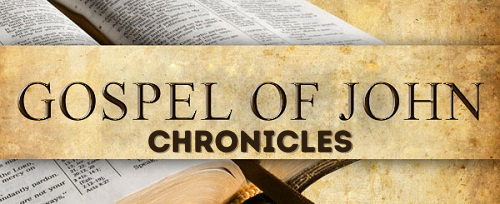“Jesus’ Arrest and Betrayal”
John Chapter 18
Jesus is arrested in the garden of the Kidron Valley, where he and his disciples often gathered. Judas knew the place as he spent time there with Jesus and the other disciples. When we consider the Synoptics account of Jesus in the garden (some scholars reference it as the Garden of Gethsemane), “John omits the vivid account of Jesus’ intense suffering and wavering before the prospect of death, which does not fit his theological perspective on Jesus’ sovereign self-control.”[i] Judas brought the chief priests, Pharisees, and police to this place where he knew Jesus would be with his disciples. “Jesus’ only motive for going to the garden is to be in the right place for Judas to find him.”[ii] They came with lanterns, torches, and weapons. John may have mentioned these light-bearing symbols as the irony of the artificial light needed to dispel the darkness of the light of the world.[iii]
Jesus asked them whom they were looking for. They answered, “Jesus of Nazareth.” When Jesus answered, “I am He,” they stepped back and fell to the ground. “This is not because Jesus had spoken the sacred name of God…rather that Jesus’ powerful word overcomes them, so that when Jesus is arrested, bound, and taken away, it is a voluntary act of his own.” [iv] Jesus asked them again whom they were looking for. They answered again, “Jesus of Nazareth.” Jesus once again answered in the affirmative. Jesus told them that if they were looking for him, they should let the other men go. This was to fulfill the prophecy that not one of those given to Jesus would be lost. “John knows the story of the disciples’ flight found in the Synoptic Gospels (Matt. 26:56; Mark 14:50) but reinterprets it as Jesus’ sovereign will rather than their cowardice.”[v] The only one arrested was Jesus.
Simon Peter pulled out his sword, struck one of the soldiers, and cut off his ear. Jesus told Peter to put his sword back into its sheath. He asks the question, “Am I not to drink the cup that the Father has given me?” They arrested Jesus and bound him. “This is an echo of the language of the garden of Gethsemane scene in the Synoptics but with a twist. John omits the scene in which Jesus has doubts, trembling before the prospect of death. In John’s story, it is only the disciples, not the sovereign Son of God, who wavers.”[vi]
The first stop was to Annas, who was the father-in-law of Caiaphas, the high priest. Caiaphas was the one who advised the Jews that it was better that one man die for the people (John 11:49). Peter and one of the other disciples (the beloved disciple) followed Jesus. The other disciple was known to the high priest and was allowed into the courtyard. He requested that Peter be permitted into the courtyard also. Annas interrogated Jesus about his disciples and his teaching. Jesus told him of his openly teaching in synagogues, temples, and places where the Jews gathered. On each occasion, nothing was said in secret. Jesus told Annas to ask them what he had said. They knew what he said.
One of the police standing by struck Jesus on the face because of the way he answered Annas. Jesus answered, “If I have spoken wrongly, testify to the wrong. But if I have spoken rightly, why do you strike me?” Annas then sent him to Caiaphas. The story then moves to Peter denying Jesus. Three times during Jesus’ questioning in the courtyard, Peter was asked if he knew Jesus – if he was one of his disciples, and three times Peter denied knowing him. After the third time, the cock crowed, testifying to what Jesus told Peter would happen (John 13:38). There is no mention of a conversation between Jesus and Caiaphas.
They moved Jesus from Caiaphas to Pilate’s headquarters. No one entered the headquarters because of Passover and the possibility of defilement.[vii] Pilate went out to meet them and asked, “What accusation do you bring against this man?” They responded that if he (Jesus) were not a criminal, they would not have brought him to Pilate. Pilate told them to take him and judge him accordingly to their law. “Pilate assumes the dispute is only an internal debate among Jews, not a matter of Roman law for which he is responsible. Judicial murder is their intent, not a fair trial. They have long since decided that he must die as a threat to their true religion and social order.”[viii] The Jews replied that they were not permitted to put anyone to death. Pilate came out again and asked Jesus,” Are you the King of the Jews?” Jesus questioned if he asked this on his own or if others told him about Jesus.
Pilate asked, “What have you done?” Jesus explained that his kingdom was not from this world. If so, his followers would be fighting to keep him from being handed over. “The point is that Jesus is indeed God’s appointed King in the present and coming Kingdom of God, but that the source of his authority and power are not from this world, is not based on this world’s assumptions, and does not use this world’s methods.”[ix] The commentary further elaborates on the notion of world governance resting on violence or the threat of violence (that we see or hear about in our world today). This is true of militant and dictatorships and of every human state and all forms of democracy. However, “Jesus’ alternative vision of the ultimate reality of God’s rule rests on self-giving love.”[x]
Pilate then asked Jesus, “so you are a King?” Jesus answered, “You say that I am a king. I came into the world to testify to the truth.” Pilate asked, “What is truth?” There was no response from Jesus. “Truth is a major theme in the Johannine theology…Jesus does not deliver the truth to his disciples, who are never said to have the truth. Truth is not an object, a body of material that can be possessed. Jesus is not a great teacher who gives disciples ‘great truths.’ He gives himself; he himself is God’s truth.”[xi] So truth is the man named Jesus Christ. I will say it again that truth is not found in a ritual, tradition, laws, or practices (they can only point us to the truth or reveal the truth in us as believers). Truth is Jesus Christ.
Pilate went out to the Jews and said, “I find no case against him.” He reminded them of the custom of releasing a prisoner during Passover. He asked if they wanted him to release Jesus or Barabbas. They shouted, “Not this man, but Barabbas (who was a bandit).
According to Boring and Craddock, this chapter, along with the last three chapters of John, may take extra time and care to give sufficient explanation, so we will not rush through these last few pages of the Johannine theology.
——————-
[i] Boring and Craddock, pg. 347.
[ii] Ibid.
[iii] Ibid.
[iv] Ibid.
[v] Ibid.
[vi] Ibid.
[vii] On the Jewish understanding of purity laws, see Luke 2:22-24; 4:33. In John’s chronology, it is the morning of the Passover, the day on which Passover lambs will be killed…the religious leaders are scrupulous in their preparations for the Passover, while oblivious to the Lamb of God who stands before them. Pg. 349.
[viii] Ibid.
[ix] Ibid., 350.
[x] Ibid. See commentary for further explanation.
[xi] Ibid.

